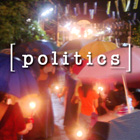
|
PLANS MAY ALREADY BE UNDERWAY FOR IRAN STRIKE
HERSH ARTICLE SAYS AGENTS ALREADY SCOUTING TARGET LOCATIONS 10 April 2006 The New Yorker magazine has published a story by investigative reporter Seymour Hersh —who also uncovered the My Lai massacre in Vietnam and information leading to the revelations about Abu Ghraib— which cites sources with links to the Pentagon and to US intelligence as saying the Bush administration may already have plans to target Iran's nuclear research facilities with "tactical nuclear weapons", i.e. 'low-yield' bombs with radioactive fuel but massive destructive capability. According to the Sydney Morning Herald, Hersh cites anonymous sources linked to the Pentagon and the US intelligence community, and specifies that "undercover American troops are already in Iran to collect target information and to establish contact with ethnic groups likely to be antagonistic to the Tehran regime". Speculation about information in the New Yorker article has been passed around in the public domain for some time, but this is the first major report detailing plans reported to be in the works or which have been confirmed by sources with access to people in the planning process. Hersh's report also specifies that the Bush administration views Iran's pres., Mahmoud Ahmadinejad, as a potential Hitler figure, due in large part to his rhetoric about "wiping Israel off the map". Ahmadinejad's aggressive posturing on nuclear research has led even the hardline ayatollahs which his ultraconservative policies favor to criticize him for going too far and risking the nation's security. But it is not clear that Iran could develop a genuine nuclear weapon in the near future, Ahmadinejad's control of the military is not guaranteed, and it might be a better policy to maintain a penetrating inspections regime, allowing Iran to use nuclear power but not control the fuel. According to Hersh, top military officials are deeply divided over the issue of "tactical" or "low-yield" nuclear weapons, and some have even threatened to resign in protest. There is concern among some Washington policy makers, thought to be primarily in the White House, that such weapons, also known as "bunker-busters" might be the only way to penetrate deep enough underground to destroy well-hidden research and development facilities. The Sydney Morning Herald's account states "Hersh says the Joint Chiefs of Staff recently unsuccessfully tried to remove the nuclear option from war planning, but the White House asked why they wanted to remove it when the initial idea came from them." There is clear disagreement within the US government on the usefulness, wisdom and legality of such action, but the Hersh story seems to show it remains a chief strategic option. Top military brass are reportedly working to remove the option from consideration, and Hersh cites one Pentagon official as saying the interest shown by civilians in defense policy in the use of "tactical" nuclear weapons is "a juggernaut that has to be stopped". A profusion of news reports seem to indicate that in fact the topic is under consideration, and one former CIA counter-terrorism chief, as reported by the Guardian newspaper, has said that special forces operations to assist groups opposed to the Iranian regime are already underway and that "people have been killed". He was referring to an incident where Baluchi-Sunni guerrillas killed 20 Iranian ministers. The Washington Post reports that a nuclear strike is not likely in the near future, but that over the long-term, the tactical "bunker-busters" might be considered as an option to strike supposed deep bunker installations. The Guardian also reports that John Bolton, US ambassador to the UN, has told British MPs that a targeted strike could slow or halt Iran's nuclear program. According to the New York Times, however, four adminsitration officials involved in Iran deliberations have said the US is not considering a nuclear strike. But evidence of nuclear posturing on both sides is also being reported: the US has conducted aircraft exercises "near Iranian airspace", which resemble a nuclear assault because they require a rapid ascent immediately after delivery. Tehran has talked up "advances" in weapons developmenet, though officially, Ahmadinejad's government maintains its nuclear research is intended only for civilian power-generation purposes. The nuclear war of wills may be as far as this goes, but it's a very high-stakes staring contest, and consensus seems to remain that resort to nuclear weapons is not a wise option for any party, however heated diplomatic tensions may become. [s] |
||||||
|
|||||||

